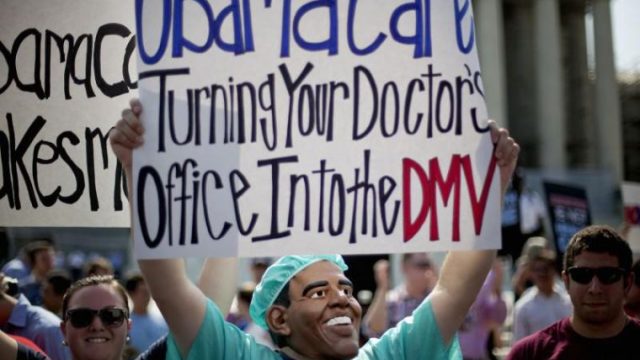Obamacare Forcing Employers To Scale Back Health Insurance Plans

Score another point for the law of unintended consequences.
The left is fond of believing that the government can wave its magic wand and accomplish their policy goals. One example is the minimum wage. The left likes to believe that raising the minimum wage improves the economy. “A rising tide lifts all ships,” I believe the argument goes, but in reality all the minimum wage does is make employing people (especially low-income workers) more expensive. The rising tide doesn’t raise all boats. It ends up drowning some people, figuratively speaking, by pricing them out of the labor market.
The same is true of Obamacare and its insurance mandates. Far from resulting in more Americans having better health care coverage, it’s prompting employers to cut back on the number of full-time employees they have while simultaneously scaling back on the health care plans they do offer:
Benefits advisers and insurance brokers—bucking a commonly held expectation that the law would broadly enrich benefits—are pitching these low-benefit plans around the country. They cover minimal requirements such as preventive services, but often little more. Some of the plans wouldn’t cover surgery, X-rays or prenatal care at all. Others will be paired with limited packages to cover additional services, for instance, $100 a day for a hospital visit.
Federal officials say this type of plan, in concept, would appear to qualify as acceptable minimum coverage under the law, and let most employers avoid an across-the-workforce $2,000-per-worker penalty for firms that offer nothing. Employers could still face other penalties they anticipate would be far less costly.
Former Obama administration officials who were involved in passing the law are shocked – shocked, I say – that this is happening:
“We wouldn’t have anticipated that there’d be demand for these types of band-aid plans in 2014,” said Robert Kocher, a former White House health adviser who helped shepherd the law. “Our expectation was that employers would offer high quality insurance.”
Part of the problem: lawmakers left vague the definition of employer-sponsored coverage, opening the door to unexpected interpretations, say people involved in drafting the law.
To quote Allan Meltzer, regulations are static while markets are dynamic.
Our friends on the left are always convinced that they can impose major policy changes on the markets without changing the way those markets operate. But that is almost never true. Taxes and regulations change the way we make decisions, whether it’s the minimum wage acting as a sort of tax on low-wage workers or Obamacare inflating the cost of providing health insurance to employees, you cannot create heavy new costs for businesses without expecting businesses to try and avoid those costs.
Some might be tempted to argue that we should impose even more policies to force these employers to comply with the law as Democrats intended them to comply, but that will only result in more unintended consequences.
While the status quo in the health care and insurance markets was anything but good before Obamacare, the simple fact is that Obamacare is making things worse.







